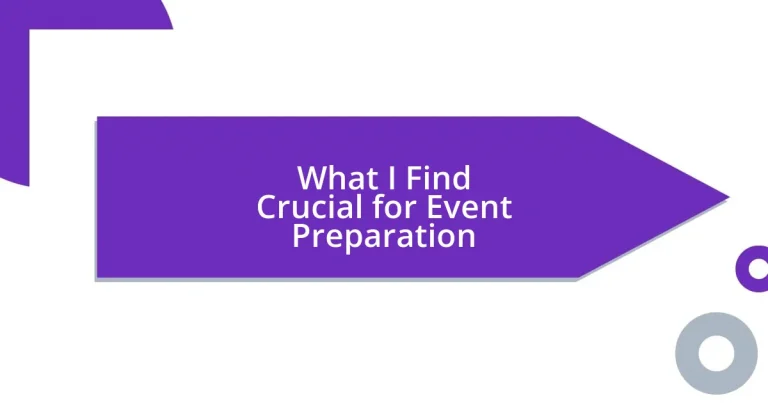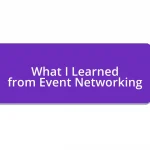Key takeaways:
- Define clear event goals early to shape the planning process and measure success effectively.
- Develop a comprehensive event plan, including a timeline, budget, guest list, and marketing strategy, to ensure smooth execution.
- Assemble a diverse and communicative team to enhance creativity and efficiency in planning.
- Conduct a final review checklist to streamline last-minute tasks and ensure all critical details are confirmed before the event.

Understand Your Event Goals
Understanding your event goals is the foundation of successful planning. I’ve often found that taking a moment to define what I truly want from an event can dramatically shift the outcomes. Are you looking to foster long-term relationships, generate leads, or simply celebrate a milestone? Each goal shapes the approach, and acknowledging this early can save time and resources.
Reflecting on my own experiences, I remember a networking event that felt aimless until I clarified our intention to make meaningful connections. Suddenly, it transformed from a simple gathering into a targeted experience where each interaction felt purposeful. It’s amazing how clarity can turn vague ideas into actionable plans, creating impactful moments that resonate long after the event is over.
Establishing clear goals also helps in measuring success afterward. How can you know if you’ve triumphed if you don’t know what you were aiming for? During one of my events, I realized that setting specific metrics, like the number of new contacts made or the level of engagement achieved, not only guided our efforts but also provided a satisfying reflection point. By understanding your event goals, you set a meaningful course that leads to greater satisfaction for everyone involved.
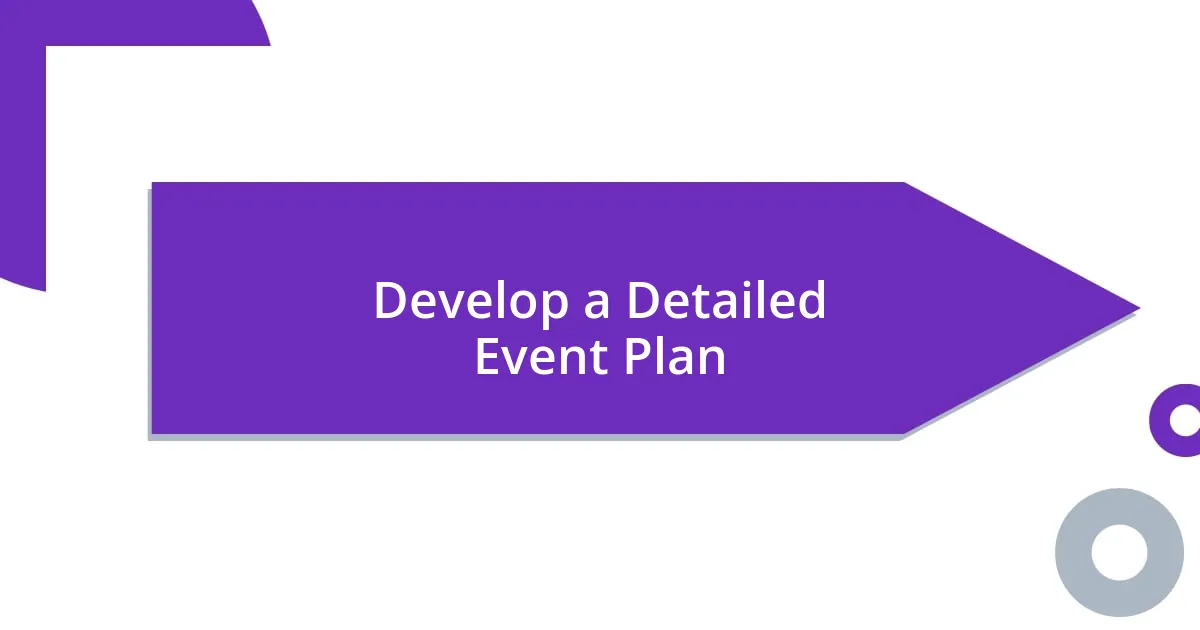
Develop a Detailed Event Plan
Developing a detailed event plan is essential for creating a smooth and memorable experience. I’ve learned that breaking the planning process into manageable sections prevents overwhelm and ensures no detail is overlooked. For example, during my first large-scale event, I attempted to handle everything at once. The chaos that ensued taught me the value of a structured plan.
When creating a detailed event plan, consider the following elements:
- Timeline: Establish a timeline with deadlines for each task.
- Budget: Create a realistic budget that includes all potential costs.
- Venue Details: Decide on a suitable location and necessary logistics.
- Guest List: Compile an organized list of invitees and their contact information.
- Team Assignments: Delegate responsibilities among team members clearly.
- Marketing Strategy: Outline how you’ll promote the event to reach your target audience.
- Post-Event Evaluation: Plan how you’ll assess the event’s success and gather feedback.
Having a comprehensive plan laid out allows for adjustments when unexpected situations arise, which I’ve faced more than once. I remember an instance where the speaker changed last minute, but because I had a flexible schedule, I could adapt without causing panic. It’s this kind of preparedness that builds confidence and helps everyone involved feel more at ease.
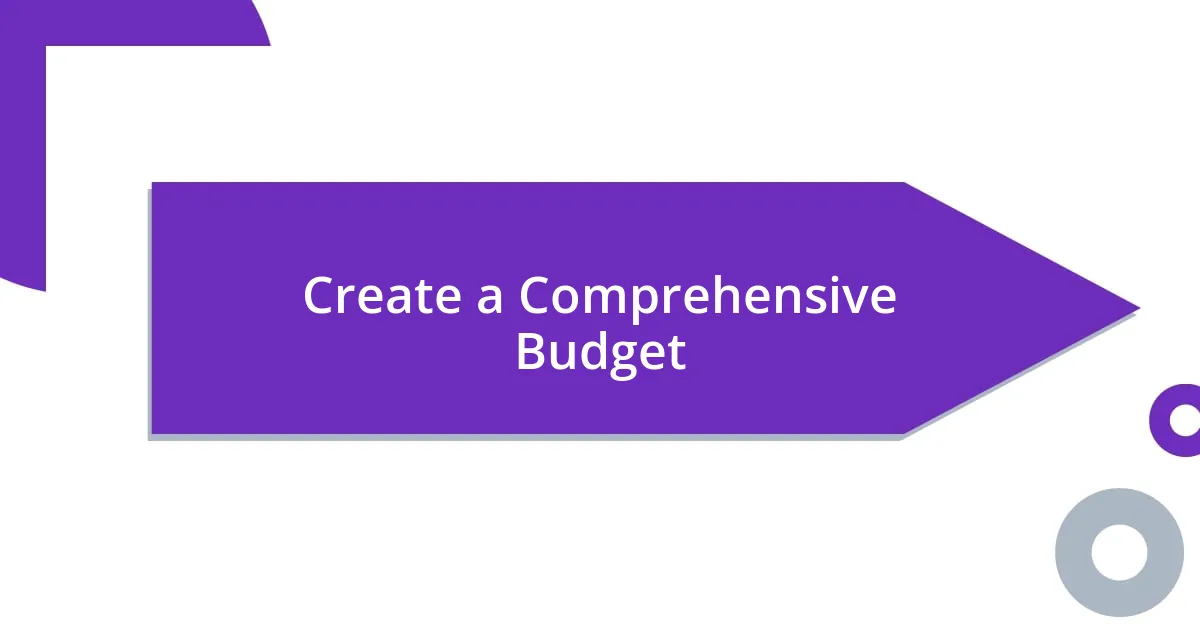
Create a Comprehensive Budget
Creating a comprehensive budget is a crucial step in the event planning process. In my experience, having a well-defined budget not only guides spending but also sets expectations for the overall event success. For instance, during one of my early events, I underestimated the costs of catering and ended up scrambling for funds last minute. That stressful experience taught me the vital importance of a detailed budget that includes all potential expenses.
I’ve found it particularly helpful to categorize costs into fixed and variable expenses. Fixed costs, like venue rental and equipment, are predictable, while variable costs, such as food and entertainment, can fluctuate based on choices. I remember a situation where we chose a more extravagant entertainment option because we didn’t anticipate how much impact it would have on the budget. By anticipating these variances, I can ensure I retain some flexibility without jeopardizing the quality of the event.
Moreover, I’ve started incorporating a contingency fund into my budget. This is essentially a safety net for unexpected costs. One time, we encountered a last-minute increase in registration fees that barely affected our budget, thanks to that contingency cushion. This small adjustment in my planning has added a sense of security and peace of mind, knowing that I’m prepared for whatever curveballs might come my way.
| Expense Type | Description |
|---|---|
| Fixed Costs | Costs that remain the same, regardless of guest count. |
| Variable Costs | Costs that vary based on the number of attendees or specific choices made. |
| Contingency Fund | A reserved portion of the budget for unexpected expenses. |
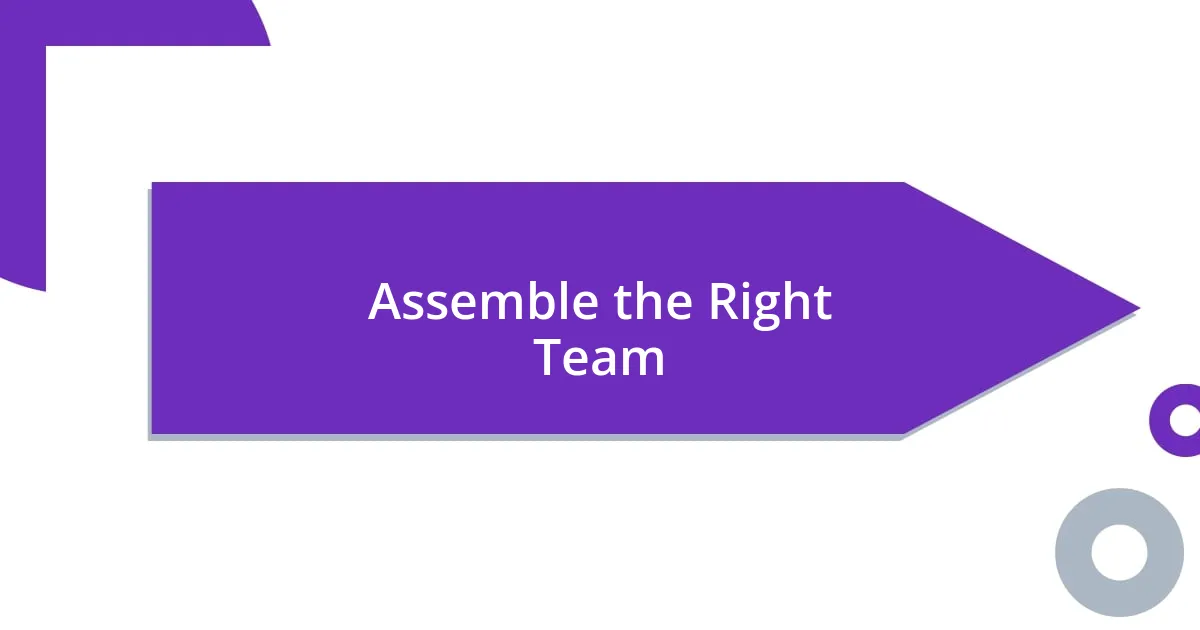
Assemble the Right Team
Assembling the right team is a cornerstone of successful event preparation. I vividly remember a particular event where I assembled a diverse group of talented individuals, each with unique strengths. It was remarkable to see how one person’s expertise in social media marketing complemented another’s background in logistics. The synergy we created made the planning process not just efficient, but enjoyable.
One part that truly sticks with me is the importance of clear communication among team members. I once worked alongside a team that lacked defined roles, and it became chaotic very quickly. There were moments where I found myself double-checking tasks because voices got lost in the noise. It’s crucial to assign roles explicitly to avoid misunderstandings. Are your teammates clear on what’s expected of them? Affirmative clarity helps foster trust and accountability, which can make or break the team dynamic.
Having a good mix of personalities within the team also contributes to creativity and morale. During one event, I’d noticed how a more analytical member balanced out a wildly creative teammate. Their discussions sparked innovative ideas, unlocking solutions that I wouldn’t have thought of alone. So, when you think about your team, ask yourself: are you bringing in people who think differently? Emphasizing diverse viewpoints can lead to exciting outcomes and create a more resilient planning process.
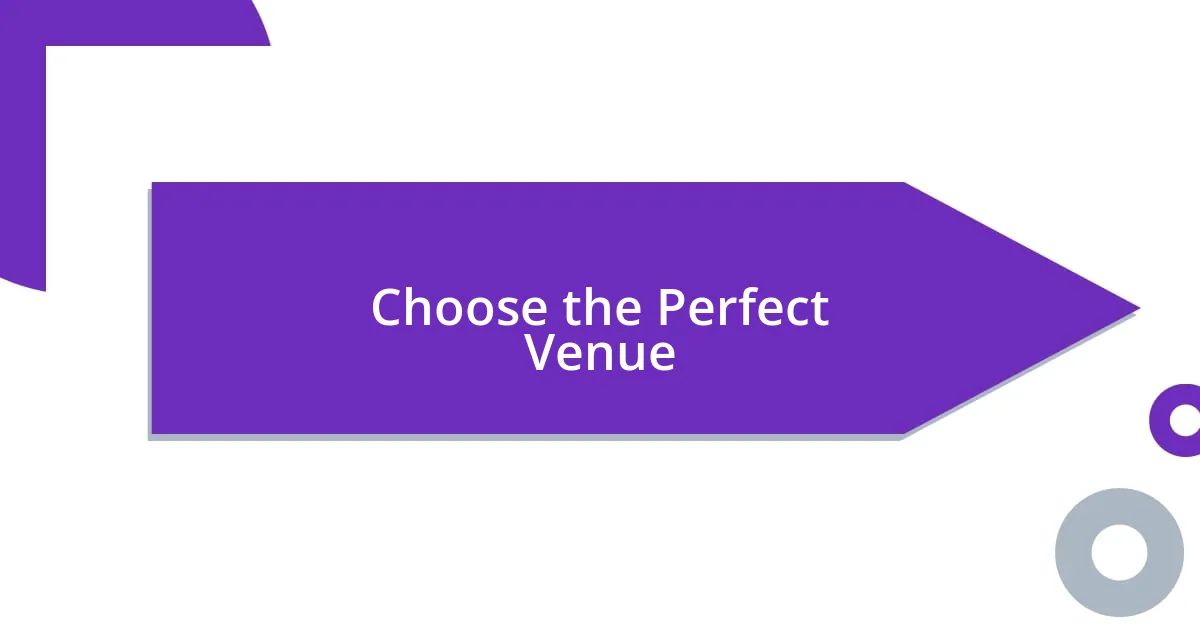
Choose the Perfect Venue
Choosing the right venue is more than just finding a space; it’s about creating an experience that resonates with your guests. During one event I organized, I fell in love with a venue that had stunning architecture but was ultimately too far from accommodations. That oversight left many attendees frustrated, and I learned firsthand how location can impact participation and overall satisfaction. Have you ever thought about how the venue’s accessibility can shape your event’s success?
The ambiance of the venue can dramatically influence the mood of your event. I once selected a venue with vibrant decor for a corporate gathering, thinking it would energize the participants. However, the lively environment led to distractions that diminished engagement. I realized later that choosing a space that aligns with the event’s purpose – rather than just its aesthetics – is crucial. How do you want your attendees to feel? The venue should amplify that sentiment.
Lastly, I much prefer venues that offer flexibility in layout. For one of my events, having movable furniture allowed us to adapt to the audience’s size, creating more intimate settings where conversations flowed effortlessly. I often find great value in spaces that can provide numerous seating configurations, as it fosters interaction and personal connections. Wouldn’t it be great to know that your venue can morph to fit your vision? Embracing these considerations while selecting a venue can truly set the stage for a memorable event.

Promote Your Event Effectively
Effective promotion is the lifeblood of any successful event. I recall when I tried a multi-faceted marketing approach for a charity gala, blending social media, email blasts, and local partnerships. Not only did this strategy widen our reach, but I also felt a genuine connection growing with the community as people shared our posts enthusiastically. Have you considered how engaging your audience through varied channels can create excitement even before the event begins?
Creating compelling content is another crucial aspect of promotion. I remember crafting a story around my event that highlighted its purpose and impact, which resonated deeply with potential attendees. By using video snippets and behind-the-scenes glimpses, I invited others into the planning process, making them feel part of something bigger. How can you tell your event’s story to spark genuine interest and emotional investment?
I’ve also learned that leveraging influencers can yield fantastic results. During one event, partnering with a local figure elevated our visibility significantly, driving ticket sales dramatically. They shared their enthusiasm for the event with their followers, who trusted their endorsement. Have you thought about how someone with a larger platform might help amplify your voice? Establishing those relationships can broaden your audience exponentially and create a buzz that traditional marketing alone might not achieve.
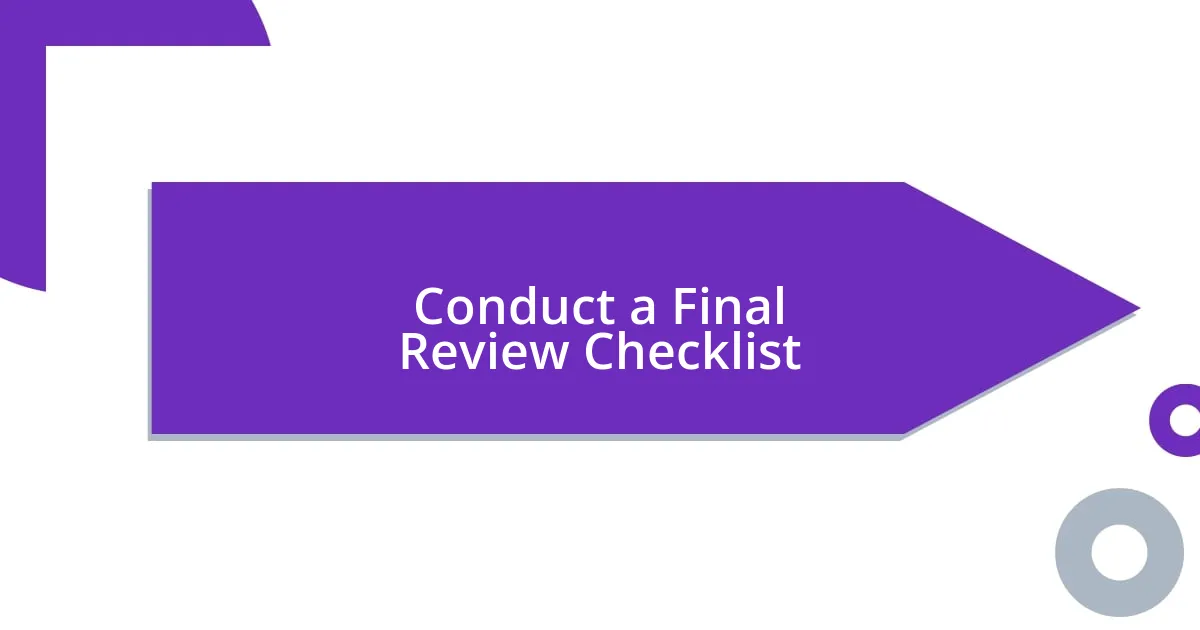
Conduct a Final Review Checklist
Conducting a final review checklist is an invaluable step in event preparation. I cannot stress enough how profoundly a checklist can help streamline last-minute tasks. For instance, I’ve been in situations where I had forgotten to confirm catering details, only to realize it hours before the event! Have you ever felt that rush of panic when you think something critical is overlooked? A well-structured checklist can serve as your safety net, ensuring nothing slips through the cracks.
I personally like to break down my checklist into categories—logistics, materials, and communications. This method not only simplifies the review process but also gives me peace of mind. During my last major event, I recalled that I almost missed checking the audio-visual equipment. Thankfully, I had a category dedicated to technical aspects, which reminded me to do a final soundcheck. How often do we forget the basics in the whirlwind of preparation?
Moreover, I find it enlightening to have a ‘team debrief’ as part of my checklist. Engaging my team in a quick meeting helps clarify roles and confirm everyone is on the same page. I remember after one event where we didn’t conduct a proper debrief; the confusion caused disagreement among team members post-event. Wouldn’t it be more productive to align everyone’s expectations beforehand? Taking the time to conduct a final review checklist not only sets a positive tone but can also transform the overall event experience into one that runs smoothly and efficiently.












